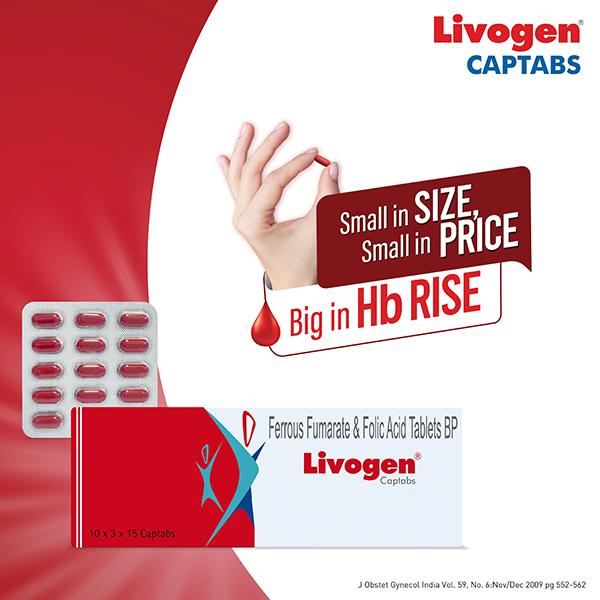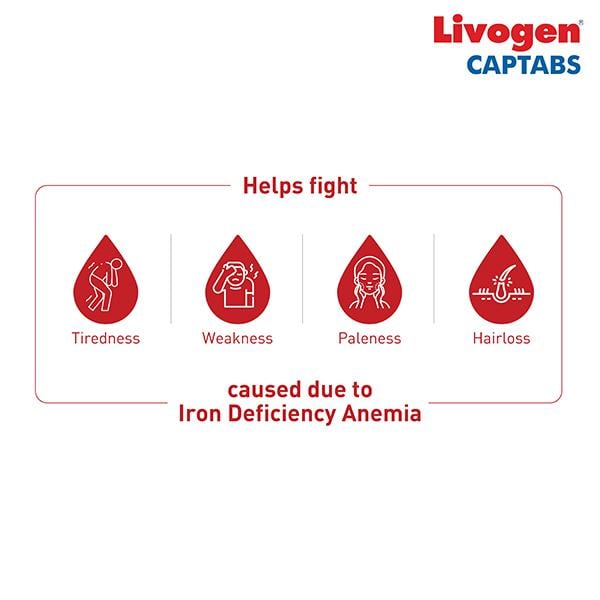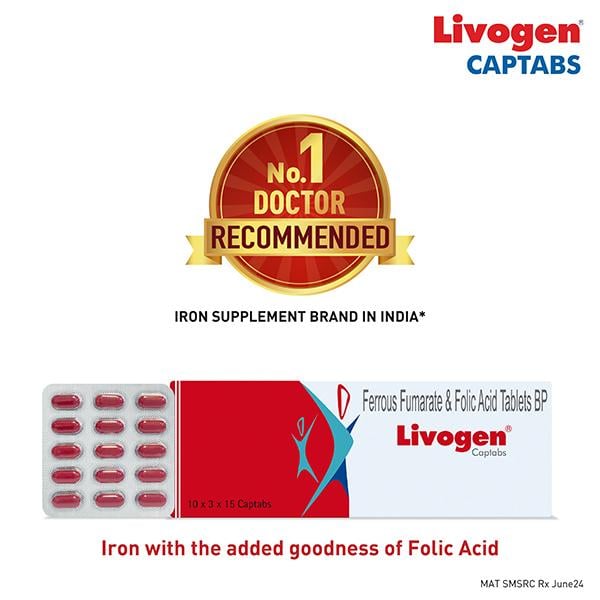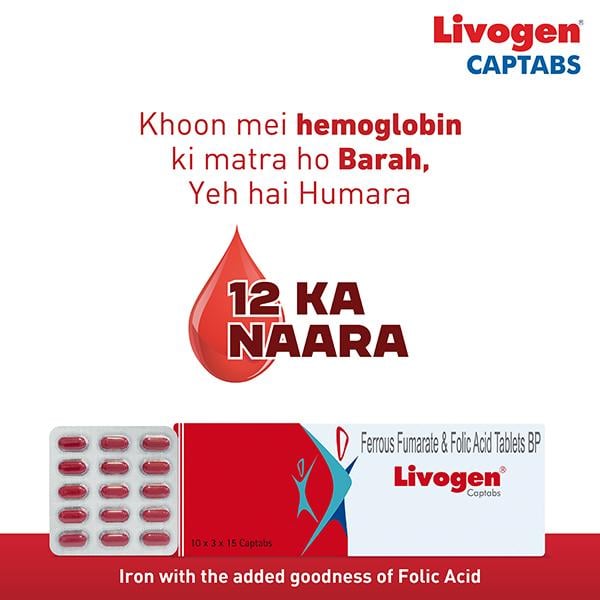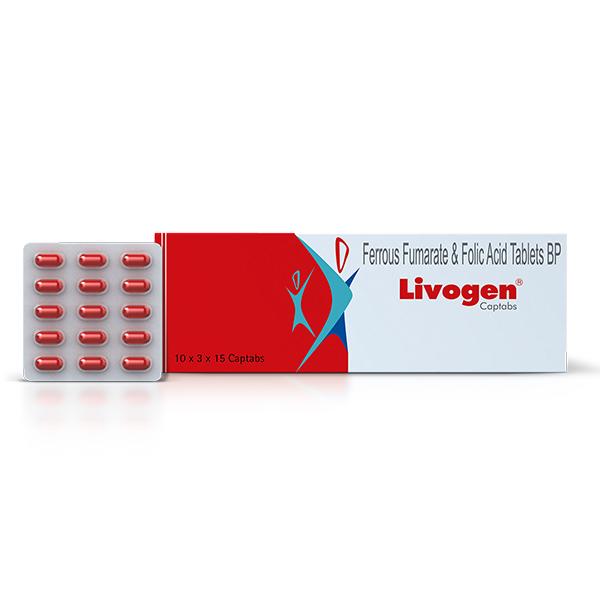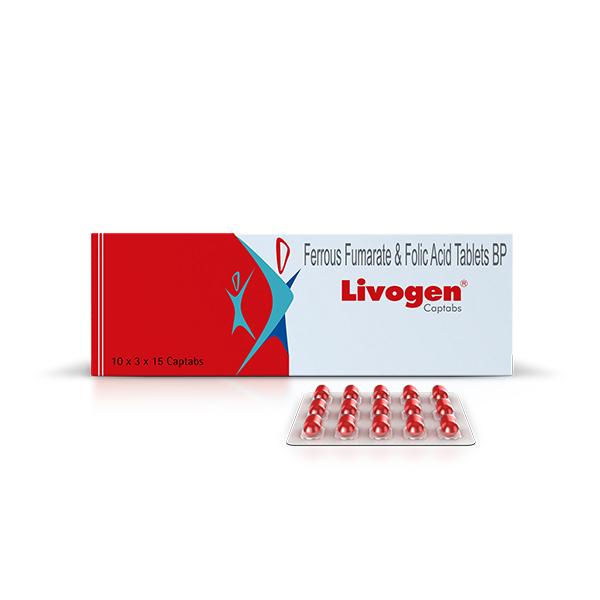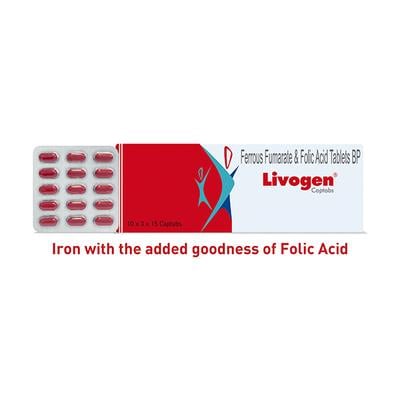

Netmeds First Membership
Introduction About LIVOGEN CAPTAB TABLET
Livogen Captab tablet is a nutritional supplement that contains Ferrous fumarate and Folic acid, which helps in the management of anaemia caused by iron and folic acid deficiency. Ferrous fumarate restores iron levels to support hemoglobin formation, while Folic acid promotes red blood cell production and DNA synthesis.
Livogen Captab tablet can be taken with or without food. For optimal absorption, consider taking it on an empty stomach. For best results, take it consistently at the same time each day. The dosage and frequency will depend on your specific condition and will be determined by your doctor. Be sure to take it exactly as prescribed and continue the medication for the full duration recommended by your doctor.
Common side effect of this medication includes nausea, vomiting, stomach upset, dark stools, constipation, diarrhea. If these symptoms bother you or seem serious, inform your doctor.
Be sure to inform your doctor about all other medications you are taking, as some may reduce the effectiveness of this medicine or alter how it works. Individuals with an allergy to iron should not use this medication. It is also not recommended for people with iron storage disorders such as hemosiderosis or hemochromatosis, or those with bacterial infections. If you have a peptic ulcer, let your doctor know before starting Livogen Captab tablet.
Uses Of LIVOGEN CAPTAB TABLET
- Anaemia
Benefits of LIVOGEN CAPTAB TABLET
01)Supports Red Blood Cell Formation: Iron is a key component of hemoglobin, aiding in oxygen transport throughout the body.
02)Enhances Energy Levels: Adequate iron levels help reduce fatigue and improve overall vitality.
03)Contributes to Healthy Cell Function: Folic acid plays a crucial role in DNA synthesis and cell division.
04)Assists in Nutritional Recovery: Beneficial during periods of increased nutritional needs, such as pregnancy or recovery from surgery.
How LIVOGEN CAPTAB TABLET Works
Livogen Captab tablet works by managing iron and folic acid deficiencies in the body. It contains ferrous fumarate, a form of iron that helps in the production of healthy red blood cells, and folic acid, a type of vitamin B that is essential for DNA synthesis and proper cell division. This combination is particularly useful in conditions like anemia caused by iron or folate deficiency, helping to increase hemoglobin levels, improve oxygen transport in the blood, and support overall energy levels and immune function.
How to use LIVOGEN CAPTAB TABLET
Follow your doctor's instructions regarding the exact dosage. Do not exceed the recommended daily dosage. Do not stop the medication without consulting your doctor, even if you feel better.
How to Take Livogen Captab Tablet?
Dosage: Take exactly as prescribed by your doctor, usually once daily, for optimal absorption, consider taking it on an empty stomach.
Timing: Preferably take the tablet on an empty stomach, either one hour before a meal or two hours after a meal, unless otherwise directed by your doctor.
Swallow whole: Swallow the tablet whole with a glass of water. Do not chew, crush, or break the tablet.
Food Interactions: Avoid consuming tea, coffee, or dairy products immediately before or after taking the tablet, as they may interfere with iron absorption
Practical Tips for Users:
- Setting Reminders: Consider using a daily alarm or reminder on your phone to ensure you take your medication at the same time every day.
- Track Your Doses: Keeping a simple medication log can help you track when you have taken the medication, making it easier to avoid missed doses.
- Avoid Overdosing: Do not exceed the recommended dosage. If you accidentally take more than prescribed, contact your doctor immediately.
What if I forgot to take LIVOGEN CAPTAB TABLET
If you forget to take a dose, take it as soon as you remember. However, if it is almost time for your next dose, skip the missed dose. Do not take two doses at once to make up for a missed dose.
Side Effects Of LIVOGEN CAPTAB TABLET
Like all medicines, Livogen Captab tablet may cause certain side effects in some individuals, although not everybody gets them.
The most common side effects of taking Livogen Captab tablet are:
- Nausea, Vomiting
- Stomach upset
- Dark stools
- Constipation
- Diarrhea
When to consult your doctor?
- Allergic reaction symptoms such as rash, itching, or swelling (especially of the face, tongue, or throat), severe dizziness, difficulty breathing
- Severe Gastrointestinal Symptoms such as severe abdominal pain, vomiting, bloody or black, tarry stools, severe constipation, diarrhea
How To Manage Side Effects
Diarrhea
- Drink Fluids: Drink clear fluids such as water, broths, and oral rehydration solutions (ORS).
- Electrolytes: If you are losing a lot of fluids (for example, from frequent diarrhea), consider drinking an electrolyte solution to help replenish lost minerals like potassium and sodium.
- BRAT Diet: Try to take Bananas, Rice (white rice), Apple sauce and Toast (plain, without butter) to control diarrhoea management.
- Avoid Certain Foods: While recovering avoid the following food items such as fatty, greasy, or fried foods, spicy foods, dairy products (especially if you have a temporary lactose intolerance), caffeinated drinks and alcohol and artificial sweeteners like sorbitol.
- Over-the-Counter Medications: You can take over-the-counter anti-diarrheal medications such as loperamide, Bismuth subsalicylate if appropriate for you. Follow the recommended dosage.
Nausea And Vomiting
- Eat Small, Frequent Meals: Avoid heavy or greasy foods. Opt for bland foods like crackers, toast, or bananas.
- Stay Hydrated: Sip on clear fluids like water, ginger tea, or electrolyte drinks, Avoid caffeinated and carbonated beverages.
- Ginger: Ginger is a natural remedy for nausea. Try ginger tea, ginger candies, or ginger ale (ensure it contains real ginger).
- Avoid Strong Odors: Minimize exposure to smells that might trigger nausea, such as perfumes or cooking odors.
Warning & Precautions
Pregnancy
Consult your doctorLivogen Captab tablet is generally considered safe to use during pregnancy. Animal studies have shown low or no adverse effects to the developing baby, however, there are limited human studies. It is important to consult your doctor before taking this medication.
Breastfeeding
Consult your doctorLivogen Captab tablet is safe to use during breastfeeding. Human studies suggest that the drug does not pass into the breastmilk in a significant amount and is not harmful to the baby. It is important to consult your doctor before taking this medication.
Driving and Using Machines
Use with CautionIt is not known whether Livogen Captab tablet alters the ability to drive. Do not drive if you experience any symptoms that affect your ability to concentrate and react.
Alcohol
Consult your doctorLimit alcohol consumption while taking Livogen Captab, as too much alcohol can reduce iron absorption and increase the risk of side effects.
Kidney
Consult your doctorThere is no proper information regarding the use of this medicine in patients with kidney problems. It is important to consult your doctor before taking this medication.
Liver
Consult your doctorThere is no proper information regarding the use of this medicine in patients with liver problems. It is important to consult your doctor before taking this medication.
Allergy
ContraindicatedDo not take this medication if you are allergic to Ferrous fumarate or Folic acid or any other ingredients of this medicine.
Use In Pediatrics
ContraindicatedLivogen Captab tablet is generally not recommended for use in children and adolescents (under 18 years of age). Consult your pediatrician before giving it.
Use In Geriatrics
Use with CautionLivogen Captab tablet should be used with caution in elderly patients (aged 65 years and above), especially those with underlying health conditions. Consult your doctor before taking this medication.
Other Warnings for LIVOGEN CAPTAB TABLET
Before taking Livogen Captab tablet, inform your doctor if you have:
- Stomach ulcers or gastrointestinal disorders
- Vitamin B12 deficiency
- Blood disorders like thalassemia or sickle cell disease
- Inflammatory bowel diseases such as ulcerative colitis or Crohn's disease
- Hemochromatosis (iron overload disorder
- History of repeated blood transfusions
Drug - Drug interaction
Inform your physician if you are taking any of the following medicine before taking Livogen Captab tablet:
1. Antacids (e.g., Calcium Carbonate, Magnesium Hydroxide)
- Interaction: Antacids can reduce the absorption of iron from Livogen by increasing the pH of the stomach. This can make the iron in Livogen less effective.
- Effect: Reduced iron absorption may lead to less effective treatment of iron deficiency anemia, potentially worsening the patient's condition.
- Management: To minimize the interaction, advise patients to take Livogen at least 2 hours before or after antacid administration. Monitoring iron levels may help adjust the treatment plan accordingly.
2. Tetracycline Antibiotics (e.g., Doxycycline, Tetracycline)
- Interaction: Iron supplements like Livogen can bind with tetracyclines, reducing their absorption and effectiveness. This interaction occurs because iron forms insoluble complexes with tetracycline antibiotics.
- Effect: Reduced efficacy of tetracyclines may result in inadequate treatment of infections.
- Management: Patients should be instructed to take Livogen and tetracyclines at least 2 hours apart to avoid interference with antibiotic absorption. Alternative antibiotics or iron supplements may be considered depending on the clinical situation.
3. Levodopa (used in Parkinson's Disease)
- Interaction: Iron in Livogen can reduce the absorption of levodopa by forming complexes in the gastrointestinal tract.
- Effect: Reduced absorption of levodopa may lead to decreased effectiveness in managing Parkinson’s disease symptoms.
- Management: To avoid this interaction, it’s advised that patients take levodopa and Livogen at least 2 hours apart. Close monitoring of Parkinson’s symptoms and levodopa doses may be needed.
4. Chloramphenicol (antibiotic)
- Interaction: Chloramphenicol may interfere with the body's ability to use iron effectively. This can impair red blood cell production and decrease the effectiveness of iron supplementation like Livogen.
- Effect: Reduced iron utilization may exacerbate the anemia or prolong the treatment period for iron deficiency.
- Management: Patients on both medications should be closely monitored for anemia signs. In some cases, an alternative antibiotic may be considered to avoid this interaction.
5. Methyldopa (used for hypertension)
- Interaction: Methyldopa and iron can interact and possibly reduce the antihypertensive effect of methyldopa. Iron may impair the absorption of methyldopa.
- Effect: The combination may lead to less effective control of blood pressure.
- Management: Advise patients to take Livogen and methyldopa at least 2 hours apart to minimize the interaction. Blood pressure should be monitored more frequently to adjust methyldopa doses if necessary.
6. Other Iron Supplements
- Interaction: Taking multiple iron supplements simultaneously can lead to iron overload, increasing the risk of toxicity and adverse effects such as gastrointestinal distress, liver damage, or even systemic complications.
- Effect: Iron toxicity may result in conditions like hemochromatosis or acute iron poisoning.
- Management: Patients should be monitored for signs of iron overdose (e.g., abdominal pain, vomiting, diarrhea). Iron supplements should not be taken concurrently unless advised by a healthcare provider.
7. Vitamin C (Ascorbic Acid)
- Interaction: Vitamin C enhances iron absorption by reducing ferric iron (Fe3+) to ferrous iron (Fe2+), a more absorbable form.
- Effect: Taking Livogen with Vitamin C can increase iron absorption, potentially leading to improved effectiveness in treating iron deficiency anemia.
- Management: In general, it is safe to take Livogen with Vitamin C. However, excessive doses of Vitamin C (e.g., >1000 mg/day) should be avoided to prevent gastrointestinal upset.
8. Proton Pump Inhibitors (PPIs) (e.g., Omeprazole, Lansoprazole)
- Interaction: Proton pump inhibitors (PPIs) reduce stomach acid production, which can impair the absorption of iron from Livogen. The acidic environment in the stomach is necessary for the conversion of ferric iron (Fe3+) to ferrous iron (Fe2+), which is more readily absorbed.
- Effect: Reduced absorption of iron can lead to decreased effectiveness of Livogen in treating iron deficiency anemia.
- Management: Patients should be advised to take Livogen at least 2 hours before or after taking a PPI. In some cases, an alternative iron supplement that is less dependent on stomach acid for absorption (e.g., ferrous bisglycinate) may be recommended.
9. Anticonvulsants (e.g., Phenytoin, Carbamazepine)
- Interaction: Anticonvulsants like phenytoin and carbamazepine may increase the metabolism of folic acid and decrease its serum levels. Since Livogen contains folic acid, this could reduce the effectiveness of the supplement in managing folate deficiency, which often coexists with iron deficiency.
- Effect: Suboptimal levels of folic acid could lead to inadequate treatment of folate deficiency and anemia, as well as potential neurological symptoms related to low folate levels.
- Management: Folic acid levels should be monitored regularly in patients on anticonvulsants, and the dose of folic acid may need to be adjusted. Alternatively, higher doses of folic acid might be prescribed, depending on the clinical needs of the patient.
10. Anti-inflammatory Drugs (e.g., Sulfasalazine)
- Interaction: Sulfasalazine, a drug commonly used for inflammatory conditions like rheumatoid arthritis and ulcerative colitis, can reduce the absorption of both iron and folic acid. Sulfasalazine interferes with folic acid metabolism by inhibiting dihydrofolate reductase, an enzyme essential for folate activation.
- Effect: Reduced absorption of iron and folic acid may lead to less effective treatment of iron deficiency anemia and folate deficiency. This can worsen anemia or delay recovery.
- Management: It is important to monitor iron and folic acid levels in patients taking both Livogen and sulfasalazine. In some cases, folic acid supplementation may need to be increased. Patients should also be instructed to take Livogen at least 2 hours apart from sulfasalazine.
Drug - Food interaction
1. Dairy Products (e.g., Milk, Cheese, Yogurt)
- Interaction: Dairy products contain calcium, which can inhibit the absorption of iron from Livogen. Calcium can form insoluble complexes with iron, making it less available for absorption in the gastrointestinal tract.
- Effect: Reduced absorption of iron, which may lead to less effective treatment of iron deficiency anemia.
- Management: Advise patients to avoid consuming dairy products within 1-2 hours before or after taking Livogen. If calcium supplementation is necessary, it should be taken at a different time of day.
2. Caffeinated Beverages (e.g., Coffee, Tea, Soft Drinks)
- Interaction: Caffeine, present in coffee, tea, and certain soft drinks, can inhibit iron absorption. Tannins in tea and coffee can bind to iron, reducing its bioavailability.
- Effect: Decreased absorption of iron from Livogen, potentially reducing the effectiveness of the treatment for iron deficiency.
- Management: Advise patients to limit the intake of caffeinated beverages around the time they take Livogen. It is recommended to consume coffee, tea, or cola drinks at least 1 hour before or after taking iron supplements.
3. High-Fiber Foods (e.g., Whole Grains, Legumes, Raw Vegetables)
- Interaction: High-fiber foods, such as whole grains, legumes, and raw vegetables, can interfere with iron absorption. Fiber may bind to iron, especially in large amounts, reducing its bioavailability.
- Effect: Reduced absorption of iron from Livogen, leading to potentially ineffective treatment of iron deficiency anemia.
- Management: Patients should avoid consuming large amounts of high-fiber foods within 1 hour of taking Livogen. They can still eat a balanced diet with fiber, but spacing the intake of high-fiber foods around iron supplementation is recommended.
4. Phytate-Rich Foods (e.g., Beans, Lentils, Whole Grains, Nuts)
- Interaction: Phytates (found in foods like beans, lentils, whole grains, and nuts) can bind to iron and decrease its absorption in the intestines. This can reduce the effectiveness of iron supplementation.
- Effect: Decreased iron absorption, which could worsen iron deficiency anemia or prolong recovery from iron deficiency.
- Management: Advise patients to avoid consuming large amounts of phytate-rich foods within 1-2 hours of taking Livogen. Soaking, fermenting, or sprouting these foods can reduce phytate content and improve iron absorption.
5. Tea and Coffee (Tannins)
- Interaction: Tea and coffee contain tannins, which can bind to iron and reduce its absorption. Both beverages are common in daily diets, but their tannin content can significantly interfere with the bioavailability of iron from Livogen.
- Effect: Reduced effectiveness of Livogen due to decreased iron absorption.
- Management: Instruct patients to avoid drinking tea or coffee with meals or around the time they take Livogen. A gap of at least 1 hour between drinking tea/coffee and taking iron is recommended to prevent this interaction.
6. Vitamin C-Rich Foods (e.g., Citrus Fruits, Bell Peppers, Broccoli)
- Interaction: Vitamin C (ascorbic acid) enhances the absorption of iron by reducing ferric iron (Fe3+) to the more absorbable ferrous iron (Fe2+). This interaction is beneficial for the absorption of iron from Livogen.
- Effect: Increased iron absorption, which can improve the effectiveness of Livogen in treating iron deficiency anemia.
- Management: It is safe and beneficial to take Livogen with vitamin C-rich foods, such as oranges, strawberries, or bell peppers, to enhance iron absorption. However, excessive doses of vitamin C (above 1000 mg/day) should be avoided to prevent gastrointestinal upset.
7. Alcohol
- Interaction: Excessive alcohol intake can impair iron absorption and may also exacerbate gastrointestinal side effects like nausea or constipation, which are common with iron supplements like Livogen. Chronic alcohol use can also affect liver function, which is important for iron storage and metabolism.
- Effect: Reduced absorption of iron and potential gastrointestinal side effects, as well as a greater risk of iron deficiency or liver-related complications.
- Management: Advise patients to limit alcohol consumption while taking Livogen, particularly if they have a history of liver disease or gastrointestinal issues. Moderate alcohol intake is usually acceptable, but excessive drinking should be avoided.
Synopsis
|
Drug |
: |
Ferrous fumarate, Folic acid |
|
Pharmacological Category |
: |
Nutritional supplement |
|
Therapeutic Indication |
: |
Anaemia |
|
Dosage Forms |
: |
Captab |
More Information
Storage
- Store Livogen Captab tablet at room temperature, typically between 20-25°C
- Keep this medication away from direct sunlight, heat sources, and humidity to maintain its effectiveness
- Store the medications in a safe location, out of reach of children and pets
- Never freeze Livogen Captab tablet, as freezing can damage the medication
FAQs About LIVOGEN CAPTAB TABLET
Q: What is Livogen Captab used for?
A: Livogen Captab is a supplement that contains Ferrous Fumarate and Folic Acid. It is primarily used to manage iron deficiency anemia, particularly in individuals who have low iron levels due to pregnancy, menstruation, or other conditions. The Folic Acid in Livogen Captab also helps support red blood cell production and healthy fetal development during pregnancy.
Q: How does Livogen Captab work?
A: Livogen Captab works by combining Ferrous Fumarate, a source of iron, which helps to replenish iron stores in the body, and Folic Acid, which aids in the production of red blood cells. Together, these ingredients help combat iron deficiency anemia and support overall blood health.
Q: Who should take Livogen Captab?
A: Livogen Captab is typically recommended for individuals who have iron deficiency anemia or those at risk, including pregnant women, women with heavy menstrual bleeding, individuals with poor dietary intake of iron, people recovering from surgery or illness that results in blood loss and vegetarians or vegans who may not get enough iron from their diet
Q: What is the recommended dosage for Livogen Captab?
A: The standard recommended dosage for Livogen Captab is usually 1 tablet per day, or as advised by your doctor. It is important to follow the instructions on the packaging or the advice of a doctor to avoid side effects.
Q: Are there any side effects of taking Livogen Captab?
A: Livogen Captab is generally well-tolerated, but some people may experience side effects such as Constipation or stomach discomfort, Nausea, Dark-colored stools (a common effect of iron supplements).
If any severe reactions occur, such as allergic reactions or severe gastrointestinal issues, consult a healthcare professional immediately.
Q: Can I take Livogen Captab with other medications?
A: Before combining Livogen Captab with other medications or supplements, it’s important to consult your doctor. Some medications, such as antibiotics or antacids, may interact with iron supplements like Ferrous Fumarate. Always inform your doctor about any other medications you are taking.
Q: Is Livogen Captab safe during pregnancy?
A: Yes, Livogen Captab is considered safe during pregnancy and is commonly prescribed to ensure the expectant mother has adequate iron and folic acid levels. These nutrients are vital for both maternal health and fetal development, especially in the early stages of pregnancy. Always consult your doctor before starting any supplement during pregnancy.
Q: How should I store Livogen Captab?
A: Store Livogen Captab in a cool, dry place, away from direct sunlight and moisture. Ensure it is kept out of the reach of children to reduce accidental ingestion.
Q: Can Livogen Captab be taken with food?
A: Livogen Captab can be taken with or without food. However, taking it with food may reduce the chance of stomach irritation or nausea. For optimal absorption, it is generally advised to avoid taking the tablet with dairy products or caffeinated beverages, as these can reduce iron absorption.
Q: How long should I take Livogen Captab?
A: The duration of use depends on your specific needs and the advice of your doctor. For those with iron deficiency anemia, supplementation may be required for several months until iron levels are restored. Pregnant women may need to continue taking it throughout their pregnancy to ensure adequate levels of both iron and folic acid.
Q: Is Livogen Captab suitable for vegetarians?
A: Yes, Livogen Captab is suitable for vegetarians, as it is free from animal-derived ingredients. However, always check the label or consult your doctor to confirm its compatibility with your dietary restrictions.












